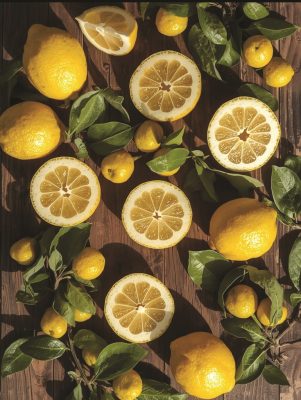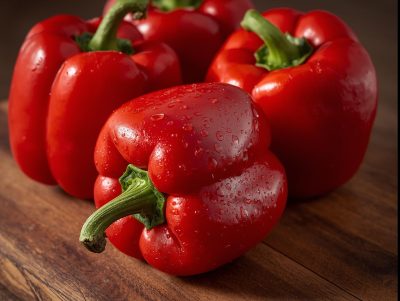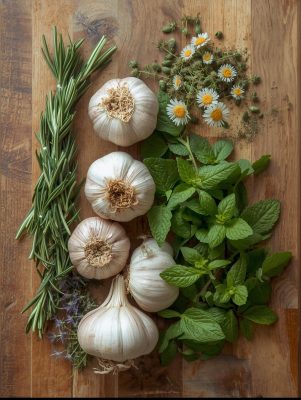Think your garden is just for show? Think again! From juicy blueberries to
immune-boosting lemons, your backyard can double as a natural medicine cabinet. Here’s how to grow your own little first-aid kit – all fresh and all homegrown.
Lemons
Growing and tending to a lemon tree teaches patience, commitment and embodying what it means to reap the fruits of your labour, and for some it even represents childhood memories and a sense of nostalgia. This powerful medicine is loaded with Vitamin C and is rich in potassium with twice as much Vitamin C as oranges. Lemons support and strengthen the immune system in fighting off the winter nasties. If your granny believed in drinking lemon water, either hot or cold, she was onto something. Freshly squeezed lemon juice increases the absorption of iron, which further promotes a resilient immune system. Lemons are a great source of flavonoids – a powerful antioxidant, which improves blood circulation and lower the risk of having a stroke.

Sweet potatoes
This super starch is packed with fibre, vitamins and minerals. Sweet potatoes are packed with beta carotene, Vitamin A and other antioxidants responsible for aiding the immune system and supporting a healthy heart, teeth and eyes. Sweet potatoes, especially the orange ones, aid the mucous membranes and ensure a healthy gut. This nutrient-dense, high fibre root veggie is versatile and can be added to your diet in both sweet and savoury dishes. Sweet potatoes can be grown in a variety of soils with some homemade compost, a good sunny spot, daily watering with adequate draining, and a little patience. We love sweet potatoes as they are not only a wonderful medicine but also a delicious and versatile ingredient with health benefits for the whole family!
Red bell peppers
Another immune-booster superfood for a go-to natural remedy, rich in vitamins A, C and K, is red pepper. These beauties are rich in antioxidant vitamins A and C and help to prevent cell damage and support the immune function. Vitamin K promotes proper blood clotting, strengthens bones, and helps protect cells from oxidative damage. They are packed with carotenoids Lycopene and Beta-cryptoxanthin, which have cancer-fighting properties especially for prostate, bladder, cervix, pancreas and lung cancer. When planting red peppers, loosen the soil deeply and mix in fertiliser, manure or compost thoroughly. They will start bearing fruit about 11 weeks after planting – not a long time for such a superfood!

Garlic
The cure-all, champion vegetable!. Classified as part of the onion genus, garlic is jam-packed with the good stuff. It has antimicrobial, antiviral and antifungal properties, which help relieve cold and flu symptoms. Garlic is high in nutrients and vitamins, especially flu-fighting Vitamin C and B6, which assist your body in recuperating faster and shortening your downtime. Planting garlic is fairly easy – pop them in the ground about 5cm apart in a sunny spot with well-drained soil. Whether you are nursing a cold or preparing your body to fight one, a couple cloves in the garden are recommended as part of your first aid kit!

Blueberries
Another champion choice for your natural first aid kit is the powerhouse of antioxidants – the blueberry. These delicious little morsels are packed with flavonoids that not only support your immune system but also reduce the chance of contracting upper respiratory infections – your first line of defence against colds and flu. Blueberries have a certain flavonoid called quercetin, usually found in dark blue and red fruits, which has antiviral properties. Quercetin also helps to prevent inflammation in cells and helps to protect the upper respiratory tract. You can easily add these little virus-fighting bombs to a smoothie, or give them to kids as a superfood snack. Avoid paying a pretty penny for blueberries, and instead, grow your own! They thrive in sunny spots sheltered from harsh wind, grow in beds or pots, and love rich, well-drained soil.
More Green Remedies:
Aloe Vera
What it helps with: Sunburn, minor burns, skin irritation, insect bites.
How to use: Break off a leaf and apply the gel directly to the skin.
Lavender
What it helps with: Anxiety, insomnia, headaches, insect bites.
How to use: Crush the flowers and inhale for calming effects, or make a soothing tea. Dried lavender under the pillow can help with sleep.
Chamomile
What it helps with: Stress, digestive discomfort, skin rashes.
How to use: Brew into a calming tea or apply cooled chamomile tea bags to irritated skin.
Mint – Peppermint or Spearmint
What it helps with: Indigestion, nausea, headaches, congestion.
How to use: Chew fresh leaves for digestion, make a tea for nausea, or inhale steam with mint leaves for blocked sinuses.
Rosemary
What it helps with: Improves memory, boosts circulation, relieves muscle pain.
How to use: Steep in hot water for tea, or use infused oil for a natural massage remedy.
Lemongrass
What it helps with: Fever, anxiety, digestive issues.
How to use: Brew fresh stalks into tea or use the essential oil for relaxation.
Ginger (can grow in pots too)
What it helps with: Nausea, sore throats, inflammation.
How to use: Fresh slices in hot water with lemon make a soothing tea.
Thyme
What it helps with: Coughs, sore throats, antibacterial support.
How to use: Steep in hot water as a natural throat tea, or use as a steam inhalation.


